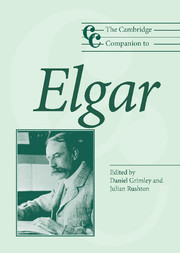Book contents
- Frontmatter
- 1 Introduction
- 2 Elgar and his British contemporaries
- 3 Elgar and his publishers
- 4 Magic by mosaic: some aspects of Elgar's compositional methods
- 5 Elgar's musical language: the shorter instrumental works
- 6 The early choral works
- 7 Elgar's later oratorios: Roman Catholicism, decadence and the Wagnerian dialectic of shame and grace
- 8 Roman Catholicism and being musically English: Elgar's church and organ music
- 9 ‘A smiling with a sigh’: the chamber music and works for strings
- 10 In search of the symphony: orchestral music to 1908
- 11 The later orchestral music (1910–34)
- 12 Elgar's unwumbling: the theatre music
- 13 Elgar and recording
- 14 Broadcasting's ally: Elgar and the BBC
- 15 Elgar in German criticism
- 16 Functional music: imperialism, the Great War, and Elgar as popular composer
- Notes
- Select bibliography
- Index
7 - Elgar's later oratorios: Roman Catholicism, decadence and the Wagnerian dialectic of shame and grace
Published online by Cambridge University Press: 28 September 2011
- Frontmatter
- 1 Introduction
- 2 Elgar and his British contemporaries
- 3 Elgar and his publishers
- 4 Magic by mosaic: some aspects of Elgar's compositional methods
- 5 Elgar's musical language: the shorter instrumental works
- 6 The early choral works
- 7 Elgar's later oratorios: Roman Catholicism, decadence and the Wagnerian dialectic of shame and grace
- 8 Roman Catholicism and being musically English: Elgar's church and organ music
- 9 ‘A smiling with a sigh’: the chamber music and works for strings
- 10 In search of the symphony: orchestral music to 1908
- 11 The later orchestral music (1910–34)
- 12 Elgar's unwumbling: the theatre music
- 13 Elgar and recording
- 14 Broadcasting's ally: Elgar and the BBC
- 15 Elgar in German criticism
- 16 Functional music: imperialism, the Great War, and Elgar as popular composer
- Notes
- Select bibliography
- Index
Summary
To Philip Brett, in memoriam
Time clears up all errors: the untruth of today is driven out by the contrary untruth of tomorrow, and the many-coloured impressions of particular minds are all eventually absorbed into the consistent light of truth.
john henry newman, 1850‘That is the penalty of my English environment.’ So Edward Elgar replied to Frederick Delius, who had just opined that he ‘thought it was a great pity that [Elgar] had wasted so much time and energy in writing those long-winded oratorios’. Elgar was visiting Delius at his home in Grez-sur-Loing on 30 May 1933, just before conducting the French premiere of his Violin Concerto. Delius, a fervent disciple of Nietzsche, despised any music Associated with organised religion; he once remarked to his amanuensis Eric Fenby that Elgar ‘might have been a great composer if he had thrown all that religious paraphernalia overboard. Gerontius is a nauseating work, and, of course, tremendously influenced by Parsifal.’
Assuming that Delius, who was as a rule brutally frank, did report Elgar's reply accurately, a question arises immediately: why did Elgar thus casually dismiss The Dream of Gerontius, The Apostles, and The Kingdom as penance imposed upon him by his environment? Even if offered in courtesy or in jest, Elgar's remark constitutes a shocking, almost Petrine, threefold denial. This appears to repudiate the oratorios, belittle the loyalty of the English listeners who supported his career, and leave Christian faith out of the question entirely. Even for such a tortured personality, riven by lacerating self-doubt and envy, Elgar's denial seems at first inexplicable. To understand the forces that motivated Elgar's renunciation of the three great oratorios and shaped their creation in the first place, one must first attend Elgar's deathbed. This chapter will place those oratorios within a cultural, historical and aesthetic perspective so as to illuminate not only their position within Elgar’s oeuvre, but also the ambivalent attitudes of their creator towards religious belief, society and aesthetics.
- Type
- Chapter
- Information
- The Cambridge Companion to Elgar , pp. 81 - 105Publisher: Cambridge University PressPrint publication year: 2005



